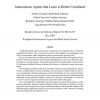Free Online Productivity Tools
i2Speak
i2Symbol
i2OCR
iTex2Img
iWeb2Print
iWeb2Shot
i2Type
iPdf2Split
iPdf2Merge
i2Bopomofo
i2Arabic
i2Style
i2Image
i2PDF
iLatex2Rtf
Sci2ools
139
Voted
AAMAS
2004
Springer
2004
Springer
Autonomous Agents that Learn to Better Coordinate
A fundamental difficulty faced by groups of agents that work together is how to efficiently coordinate their efforts. This coordination problem is both ubiquitous and challenging, especially in environments where autonomous agents are motivated by personal goals. Previous AI research on coordination has developed techniques that allow agents to act efficiently from the outset based on common built-in knowledge or to learn to act efficiently when the agents are not autonomous. The research described in this paper builds on those efforts by developing distributed learning techniques that improve coordination among autonomous agents. The techniques presented in this work encompass agents who are heterogeneous, who do not have complete built-in common knowledge, and who cannot coordinate solely by observation. An agent learns from her experiences so that her future behavior more accurately reflects what works (or does not work) in practice. Each agent stores past successes (both planned a...
AAMAS 2004 | Autonomous Agents | Common Built-in Knowledge | Coordination Problems | Intelligent Agents |
Related Content
| Added | 15 Dec 2010 |
| Updated | 15 Dec 2010 |
| Type | Journal |
| Year | 2004 |
| Where | AAMAS |
| Authors | Andrew Garland, Richard Alterman |
Comments (0)

